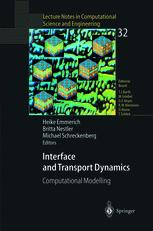

Most ebook files are in PDF format, so you can easily read them using various software such as Foxit Reader or directly on the Google Chrome browser.
Some ebook files are released by publishers in other formats such as .awz, .mobi, .epub, .fb2, etc. You may need to install specific software to read these formats on mobile/PC, such as Calibre.
Please read the tutorial at this link: https://ebookbell.com/faq
We offer FREE conversion to the popular formats you request; however, this may take some time. Therefore, right after payment, please email us, and we will try to provide the service as quickly as possible.
For some exceptional file formats or broken links (if any), please refrain from opening any disputes. Instead, email us first, and we will try to assist within a maximum of 6 hours.
EbookBell Team

4.7
16 reviewsThe workshop on "computational physics of transport and interfacial dynam ics" was held in Dresden, Germany from February 25 to March 8,2002. The Max Planck Institute for the Physics of Complex Systems has sponsored the workshop and the preliminary lecture-based seminar. The workshop has closely pursued the recent progress of research in com putational physics and materials science, particularly in modelling both traf fic fiow phenomena and complex multi-scale solidification. These branches of science have become topics of considerable diversity linking disciplines as different as physics, mathematical and computational modelling, nonlinear dynamics, materials sciences, statistical mechanics and foundry technique. The international workshop brought together experts from different fields in order to enhance the exchange of knowledge, to assess common interests and to provide closer cooperation between different communities of researchers. The workshop intended to create a comprehensive and coherent image of the current research status and to formulate various possible perspectives for joint future activities. Special emphases laid on exchanging experiences concerning numerical tools and on the bridging of the scales as necessary in a variety of scientific and engineering applications. An interesting possibility along this line was the coupling of different computational approaches leading to hybrid simulations. In this sense, we explicitly addressed researchers working with different numerical schemes as diverse as cellular automata, coupled maps, fi nite difference and finite element algorithms for partial differential equations (e. g. phase-field computations).